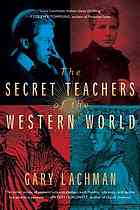
The Secret Teachers of the Western World
کتاب های مرتبط
- اطلاعات
- نقد و بررسی
- دیدگاه کاربران
نقد و بررسی

October 12, 2015
Lachman (Revolutionaries of the Soul), a musician and occult historian, constructs a loose argument about humankind’s flow from a “right brain” (intuitive) consciousness to a “left brain” (rational) consciousness, in this elaborate history of esoteric theory and thought from antiquity to the present. It’s less a depiction of “secret teachers” than the title implies, though the text makes plenty of space for individual figures. Lachman makes the enthralling, complex work accessible by clearly connecting different concepts. He begins by laying out a brief description of what esoteric thinking entails and moves chronologically through an almost unwieldy number of disparate intellectual threads. Lachman brings the work full circle by reflecting on the state of esoteric knowledge today and returning to his right brain/left brain formulation. He suggests that mankind may be moving into another creative period like the Renaissance, in which both forms of consciousness coexist; though he says he seeks to “make no prophecy” beyond that he believes such a period is possible. Lachman’s book is most successful as a thoughtful history of “rejected knowledge” and its proponents, and on those terms it can be rich and rewarding.

October 15, 2015
A writer on esoteric and occult subjects looks at the people who influenced Western thought through theories of a "living, intelligent universe through which [individuals] could participate through...[the] imagination." In his latest book, Lachman (Aleister Crowley: Magick, Rock and Roll, and the Wickedest Man in the World, 2014, etc.) uncovers the esoteric or "secret" knowledge that underlies Western philosophy. He suggests that two bodies of knowledge coexist together like the left and right sides of the brain: traditional Western philosophies focus on " 'facts' that can be grasped by the senses and proven by measurement," whereas esoteric ones focus on knowledge of "the invisible and intangible." The author examines the work of such pre-Socratic thinkers as Thales and Pythagoras and sets their ideas in the context of Greek, Egyptian, Roman, and early Christian history. These lesser-known philosophers, along with more celebrated ones like Plato, were all to some degree concerned with explorations of gnosis, the inner experience of spirituality that could potentially lead everyone to "share equally in the divine." In the centuries to follow, medieval Christian fraternities like the Cathars and Rosicrucians turned to Gnosticism to challenge established Christian dogmas. As Renaissance Europeans turned away from God and toward science to explain reality, esotericism took on the role of the "unconscious" mind in a world growing increasingly dependent on rational explanation. Yet as Lachman shows, esoteric knowledge persisted, especially in the face of social, political, and economic uncertainty, and could be found in the work of poets as diverse as Dante, Goethe, and Blake. In the modern era, esotericism re-emerged as part of so-called New Age knowledge and practices involving, for example, tarot and astrology. The author's conclusion--that the time has come for a synthesis of traditional and esoteric forms of knowledge--is fascinating. But where the author is most successful is in how he manages to make basic concepts in esoteric philosophies and history lively as well as readable. A sharp, engrossing book for open-minded readers.
COPYRIGHT(2015) Kirkus Reviews, ALL RIGHTS RESERVED.

November 15, 2015
Lachman (Evolution of Consciousness, California Inst. of Integral Studies; Politics of the Occult) presents this work as "a serious study of our 'rejected knowledge' and an engagement with some of the people pursuing it today" and successfully achieves his first goal of a scholarly study of the "rejected" knowledge of the Western esoteric tradition. This comprehensive history engagingly traces a way of thinking and living that was often at the margins of accepted Western society. While it would be easy to sensationalize such a past, Lachman deftly navigates between the extremes of presenting a unified "conspiracy" behind hermeticism and a polemical attack on its opponents. It is an academic work, not a practitioner's guide, which ranges from discussions on Plato to Carl Jung and onto the New Age as well as current explorations in alternative spiritual traditions. Lachman further briefly considers important mystics from the Jewish, Christian, and Islamic traditions who informed the esoteric tradition. VERDICT This solid introduction to occult and esoteric history provides a sensible foundation for any reader who finds appeal in the current interest in participatory spirituality as distinct from simply holding specific religious beliefs.--Daniel Wigner, South Plains Coll., Lubbock, TX
Copyright 2015 Library Journal, LLC Used with permission.

























دیدگاه کاربران